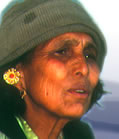THEMES IN THIS
TESTIMONY
Agriculture

Community Activities

Development

Economics

Education

Employment and Income

Environment

Family Life

Festivals

Gender

Health

Identity

Justice and crime

Migration

Social Relationships

Spiritual Beliefs

Click on arrows
to find more
testimonies
featuring
these themes
|
|
Sex
|
male
|
|
|
Age
|
23
|
|
|
Identity
|
Gautam Buddha, Tamang caste
|
|
|
Occupation
|
farmer
|
|
|
Location
|
Ichok VDC, Sindhupalchok
|
|
|
Date
|
1994
|
|
summary
This is a good and comprehensive interview in which Mani presents detailed perspectives and experience on a range of issues. It is clear throughout that the narrator is a strong believer in equality. He feels that education makes people more broadminded and empowers them, and soon “all are equal”. In the past, when the better educated Bahun and Chettri came to the village, the “Tamang would look like a dog, which was beaten by a stick. They would order us to do something, we had to do whatever they had told us … Nowadays, they cannot dominate us”. Before there was widespread education, “in our village, big people dominated the small … now everybody knows something. Nobody can dominate one another”.
It is evident that Mani also believes in gender equality. In his opinion, “to respect men more than women is a wrong thing … I know many works are done by a woman … She has to cook, wash all things by herself. When she wants to talk, then why people will stop her speak? It is a wrong thing”. He also discusses the importance of village unity and cooperation. He helped form a local group to promote village development – a Savings Group – “we all are one family. We want to develop our village”. Other topics covered are marriage and death customs, the environment, health, local institutions, politics, gender relations, and the “traffic” in girls becoming prostitutes in India.
detailed breakdown
|
You will need a password from Panos to view the full
transcript of the interview. To apply for a password, click here.
Once you have a password, click here to go to the beginning
of the transcript. You can also click on any section of the
breakdown of content below and go straight to the
corresponding part of the transcript.
|
| Section 1-3 |
Brief mention of family division of labour. Narrator received adult education from AAN classes (set up in 1989).
Benefits of education: “Many people don't know anything, that's why they have to face difficulties. If you get good education you will get any job. You can speak and give new ideas to others.” He suggests that education has reduced caste differentiation and he believes education can be empowering.
|
| Section 4-5 |
Expansion of village into the jungle. Lists festivals celebrated.
Critical of people drinking alcohol:“They will drink without limit and finish all money in one sitting… After drinking they will fight and quarrel”
Views on high cost of funerals (Ghewa): “They think if they do Ghewa it will reach to the dead person and they will get benefit from it… But I don't think like this. Because of spending so much money, even the living people will die.” Describes financial problems from spending for festivals.
Description of marriage ceremony. In the past some girls were forced into marriages but now, “If a girl doesn't like a boy, or if a boy uses force to marry her, then the law will catch him. So without the girl's will, a boy cannot marry a girl nowadays.”
Diseases: says they are seen as curses from the gods.
|
| Section 6 |
Infant mortality is declining: “In the olden days many children were born, most of them died. Women gave birth every year. Nowadays, it is becoming less and also death rate is decreasing.” Treatment: “In those days we didn't have hospitals, we had to take sick people to Dhami Jhankri. Now we take them to the health post and hospitals.” He does not believe in traditional medicine and claims it is “a waste of money.”
|
| Section 7 |
Division of labour in the family.
Criticises his sister’s school and its unreliable teacher. Returns to the benefits of education and effect on caste: “Look at me when I didn't know anything people dominated me. Now I know something, they can't dominate me.”
Brief discussion on agriculture
|
| Section 8-9 |
Yields are less than the past: “Everyone cuts down trees, all the plants and trees are going to finish. That's why the soil is decreasing and the production capacity is also becoming less.”
Good passage on the effects of environmental degradation. Talks about lack of clean water and sanitation: “We get drinking water from the stream which is very dirty. It takes one hour to bring water from there.”
Animal husbandry: advantages of rearing goats.
Detailed account of increases in food prices. Less land for agriculture because of population growth. Differences between men and women's wages. Communal spirit – formed a club to promote village development. |
| Section 10-11 |
Initial suspicion from others about the club.
Village system of justice now and in the past. Belief in human equality: “We all are the same, if we cut our vein, blood comes red.”
Gender relations: expresses enlightened attitude to equality. Mentions value of women's work, and their education: “People say, what women will do, going to school? But in my opinion women will do better than men going to school.” Mentions changing attitude to women in society however, “still we have some people who dominate women.”
|
| Section 11-12 |
Interesting passage about the greater importance of boys.
Changing system of political appointments – democratisation. Caste discrimination in politics. Says among his own caste, “We don't have unity, we can't discuss anything together.” Explains people don't vote along caste lines.
His caste don’t tend to seek employment elsewhere (except young people who go to work as labourers). Can't see the benefit of working abroad.
|
| Section 12-13 |
Long discussion concerning girls going off to India to become prostitutes. Suggests 50% (?) of the girls in the village go to Bombay and Calcutta. They are enticed “easily”, with promises of an easy life. Attitudes to girls who return from India. Discussion of why girls go, and how some return again. Suggests that families think it's good for them to go, although he personally doesn't agree ("I feel they are selling their pride to another country"). There seem to be no alternatives to this flow. No one involves the police, because they can easily be bribed.
|
| Section 14 |
Brief mention of a fairly miserable childhood. His father drank a lot, and he had to work in the fields from a very early age. Tragic concluding comment about difficulties faced in his life.
Interviewer adds extra details about the village and prostitution. |
|


